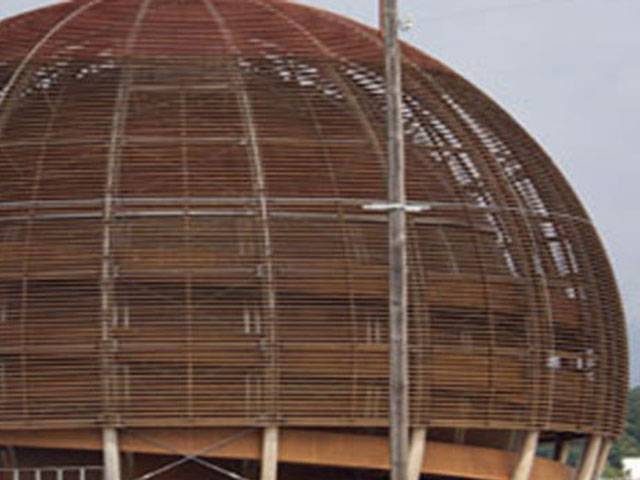ISLAMABAD - Member engineering Pakistan Atomic Energy Commission (PAEC) Syed Ziauddin said yesterday that out of many phases of building nuclear power plants Pakistan had attained self-sufficiency in some stages.
He however admitted that complete self-sufficiency in building atomic reactors was a lengthy process. He was addressing a seminar on "Nuclear Energy Scenario in Pakistan" organised by Pakistan Nuclear Society (PNS), here Saturday.
He said Pakistan was preparing as many as 500 instruments used in atomic reactors with its own resources, however, the country had to import majority of the tools and parts.
He was of the view that nuclear power plants should be built after making due consultations.
Addressing the seminar Dr Ishfaq Ahmad (NI, HI, SI) former chairman Pakistan Atomic Energy Commission said Pakistan nuclear energy programme was running successfully on international safety parameters outlined by International Atomic Energy Agency (IAEA).
Prior to this Dr Syed Javaid Khurshid, President PNS welcomed the guests while shedding the light on the mandate of Pakistan Nuclear Society to promote research and development in nuclear science and technology.
Keeping in view this mandate, PNS has started awareness programme by arranging seminars and today's seminar is first of its series, a press release said.
He said PNS was developing a visionary and looking forward Higher Scientific Board or Advisory Board on the lines of American and European Nuclear Societies, he added.
He hoped that in future PNS would become effective in dealing the climate change issues and turn into strong transmitter of nuclear scientific information for the industry and academic world.
He said after generating energy from nuclear power plants Pakistan could reduce carbon emissions and maintain transmission of electricity on a large scale.
Muhammad Naeem, HI, SI Chairman Pakistan Atomic Energy Commission while giving presentation on PAEC civil nuclear programme 2030 & beyond, said that since 1975, Pakistan in collaboration with China had started peaceful use of nuclear technology.
He said that PAEC had excellent integrated power planning, waste management techniques, operations and maintenance, quality assurance, human resource development, an above all best geological survey team before starting any project.
He said Pakistan had been running three nuclear plants successfully for the last 60 years. He Pakistan was now building four more atomic reactors out of which two projects of 1000 MW were in different stages of completion in Karachi and these will start working in 2020.
He said Pakistan government had set 8800MW target for Pakistan Atomic Energy Commission by 2030. His presentation covered nuclear power generation aspects and future strategy to face the energy challenges.
While giving a presentation on Nuclear energy scenario worldwide Dr Ansar Parvez, HI, former chairman PAEC was of the view that in nuclear energy all stakeholders should play their safety role for nuclear power plants.
He said that nuclear renaissance which started from year 2000 made it possible to generate nuclear electric production worldwide.
He said that K2 and K3 power plants which under construction in Karachi were third generation power projects and modern safeguards and safety measures would be taken there. He further said that in case of any emergency these plants could have the ability stop working automatically.
Syed Ziauddin, Member engineering PAEC gave a presentation on indigenisation of nuclear power reactors.
At the seminar Anwar Habib, Chairman Pakistan Nuclear Authority (PNRA) spoke how effective PNRA is in regulating nuclear safety laws in Pakistan as a representative of IAEA.
He said any power house takes six to seven years after start of work and then begins generating energy. He international safeguards are observed during this whole process. He said Pakistan nuclear institute also monitors the whole process as per international norms.
The seminar was arranged to generate deliberations among scientists and researchers associated with this field. A large number of scientists, researchers and academicians attended the seminar.
Friday, April 19, 2024
Pakistan not self-sufficient in building N-power plants: Member PAEC
NA-122 vote controversy

Opposition objects to oath-taking of MNAs amid lawlessness
5:15 PM | April 19, 2024
Electioneering to end on Friday night ahead of by-polls in 21 constituencies
5:14 PM | April 19, 2024
Fawad Chaudhry granted bail in 14 cases related to May 9 violence
5:13 PM | April 19, 2024
British Army chief lauds Pakistan Army's professionalism, expertise
5:12 PM | April 19, 2024
Israeli aircraft fire missiles at Air Force assets in Iran: Report
3:52 PM | April 19, 2024
A Tense Neighbourhood
April 19, 2024
Dubai Underwater
April 19, 2024
X Debate Continues
April 19, 2024
Hepatitis Challenge
April 18, 2024
IMF Predictions
April 18, 2024
Kite tragedy
April 19, 2024
Discipline dilemma
April 19, 2024
Urgent plea
April 19, 2024
Justice denied
April 18, 2024
AI dilemmas unveiled
April 18, 2024
ePaper - Nawaiwaqt
Advertisement
Nawaiwaqt Group | Copyright © 2024





